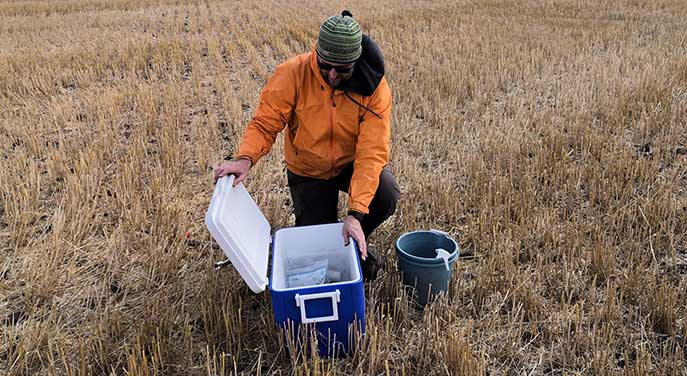
Soil scientist Derek MacKenzie is leading a project to compile a database of thousands of soil samples from across Alberta to help local farmers assess and optimize soil health. (Photo: Jeff Battigelli)
A new project is, for the first time, harnessing information from thousands of soil samples into one big database to get an idea of how healthy the province’s agricultural soils are.
The two-year initiative brings together decades of data collection on soil samples from 44 benchmark sites across the province so that they can be analyzed through machine learning.
Once completed, the comprehensive Database on Alberta Soil Health will support farmers in their sustainable land management practices, says project researcher Derek MacKenzie, a soil scientist in the Faculty of Agricultural, Life & Environmental Sciences at the University of Alberta.
The project helps fill a demand for big data in soil science, he adds.
“We’re data-hungry in this field. It’s time-consuming to collect and process many physical samples, break them down into subsamples and then analyze them further, so this database brings it all together.”
| RELATED CONTENT |
| How changes in ancient soil microbes could predict Arctic future By Kate Willis |
| New research will map out how much carbon prairie soil is storing By Bev Betkowski |
| What the heck are jumping worms? By Geoff Carpentier |
The initiative also digs deeper into the concept of soil health.
“It moves beyond the traditional idea of soil quality, which considers factors like fertilizer and herbicide used to drive production, but tends to skip over the idea that there should be a natural microbial community driving nutrient availability in soil,” he says.
“Instead, we’re looking at soil health, which is more about carbon being stabilized in soil and the microbial communities that carbon supports. Those are what make soil a functional ecosystem, and that can lead to more sustainable agriculture not just here, but globally.”
Based on almost 3,000 samples the Alberta government has gathered since 1997, the database will include and analyze parameters for soil health, climate patterns, land values and several other factors.
“Machine learning has the ability to make connections among thousands of data points that would simply overwhelm the human brain, so using it will efficiently pinpoint patterns for sustainable agricultural management practices,” MacKenzie says.
The project will also involve developing an electronic platform for landowners to enter information about their soil, land management practices and yields into the public domain.
“The data would be regionally specific so neighbours are helping one another, while at the same time creating big data that helps everyone manage their soils properly,” MacKenzie says.
To accomplish that, a free, easy-to-use, web-based app will be developed for farmers and other landowners to assess their soil and plot out how they measure, maintain and improve its quality and health.
Farmers will be able to enter their postal code to review data specific to their region. “The app could ask about what crops a farmer is producing, process the data and list the most efficient management practices for that area.”
The data could also help producers apply for carbon credits if such environmental programs are developed, MacKenzie notes.
“Agricultural management practices can theoretically help soils store more carbon, which would help mitigate climate change. And this gives producers, as stewards of the land, a way to be involved in solutions like this.”
| By Bev Betkowski
Bev is a reporter with the University of Alberta’s Folio online magazine. The University of Alberta is a Troy Media Editorial Content Provider Partner.
The opinions expressed by our columnists and contributors are theirs alone and do not inherently or expressly reflect the views of our publication.
© Troy Media
Troy Media is an editorial content provider to media outlets and its own hosted community news outlets across Canada.

